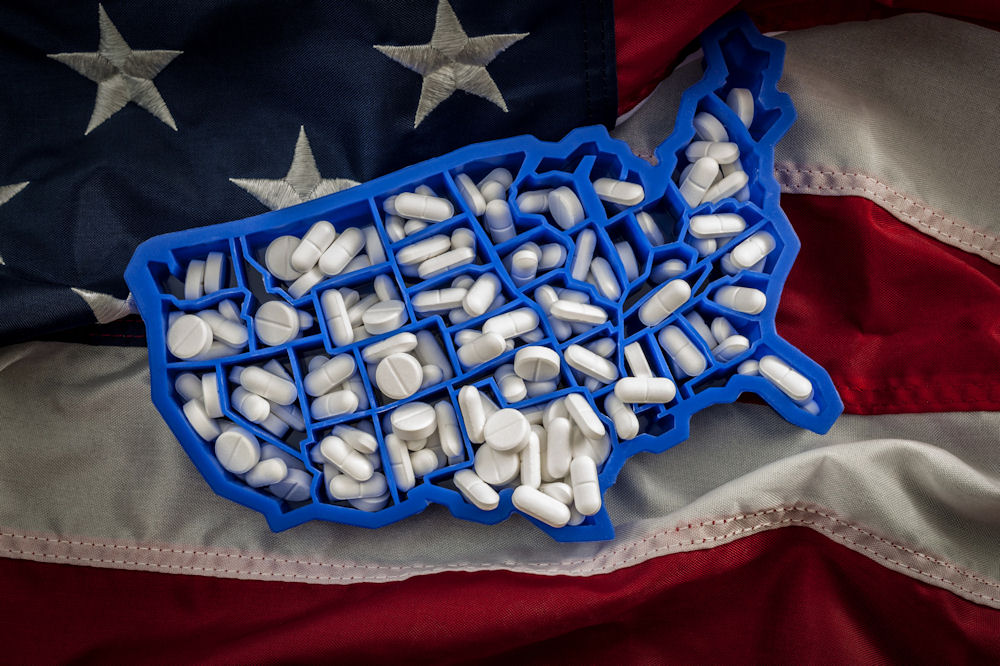
The use of drugs, both legal and illegal, is a prevalent issue in society today. From prescription medications to recreational substances, the consumption of drugs affects many people in New Jersey and around the world. It is important to understand the potential risks and effects associated with drug use in order to make informed decisions and prevent harm. Learn here at Blue Star Recovery about the substances that are frequently used and have the potential to be abused or lead to addiction.
What is the Most Commonly Used Drug in New Jersey?
Based on the Drug and Alcohol Abuse Report from the New Jersey Department of Health and Senior Services, the state witnesses over 60,000 yearly admissions for drug treatment. Among those admitted, heroin was indicated as the primary abused drug by 42%, cocaine by 13%, and marijuana by 9% of those seeking treatment.
Other commonly abused drugs are listed below, along with some of their side effects.
The effects of alcohol effects include:
- Impaired judgment, coordination, and memory
- Slurred speech
- Slowed reflexes
- Increased risk of accidents
- Liver damage
- Addiction
Alcohol is easily accessible and socially acceptable. This can encourage alcohol abuse. If you struggle with alcohol use, Blue Star Recovery provides alcohol rehab in New Jersey to help you overcome addiction.
Tobacco is a plant-based product that, when smoked or used in other forms, can lead to a range of health issues. Its addictive properties make it challenging for many individuals to break free from its grip, while its association with serious health risks, such as heart disease and cancer, underscores the importance of quitting and seeking support for tobacco addiction.
The effects of tobacco include:
- Increased heart rate and blood pressure
- Risk of heart disease
- Lung damage
- Addiction
- Increased risk of cancer
Opioids are a class of prescription pain relievers derived from opium or synthesized to mimic its effects. They are known for their powerful pain-relieving properties and are often used in medical settings to manage severe pain. Common opioid medications include oxycodone, hydrocodone, morphine, and fentanyl.
The effects of prescription painkiller include:
- Pain relief
- Euphoria
- Drowsiness
- Slowed breathing
- Addiction
- Risk of overdose
The effects of benzodiazepines include:
- Sedation
- Relaxation
- Reduced anxiety
- Drowsiness
- Risk of developing dependence
- Withdrawal when stopping use
Benzodiazepines are prescription medications commonly prescribed for anxiety, insomnia, and seizures. It’s necessary to be very cautious when using benzodiazepines due to their potential for dependence, withdrawal symptoms upon discontinuation, and increased overdose risk when combined with other substances. Consulting a healthcare professional for guidance on their use is crucial for safe and effective treatment. You can get benzodiazepine addiction treatment at Blue Star Recovery.
Amphetamines are a class of central nervous system stimulant drugs that can increase energy, alertness, and concentration. They are sometimes prescribed to treat conditions like attention deficit hyperactivity disorder (ADHD) and narcolepsy but are also used illicitly for their euphoric effects.
Addiction to amphetamines can develop when individuals misuse these drugs for their stimulating and euphoric properties. Over time, the brain can become dependent on amphetamines, leading to cravings and compulsive drug-seeking behaviors.
The effects of amphetamines include:
- Increased energy and focus
- Feelings of euphoria
- Increased heart rate and blood pressure
- Potential for addiction
- Increased risk of psychosis
Methamphetamines, often referred to as “meth,” are a highly potent and highly addictive stimulant drug. They belong to the amphetamine class of drugs and are known for their powerful effects on the central nervous system. Methamphetamine is often found in the form of a white, odorless, bitter-tasting crystalline powder that can be ingested, snorted, smoked, or injected.
The effects of using meth include:
- Intense euphoria
- Increased energy
- Decreased appetite
- Severe dental issues “meth mouth”
- Skin sores
- Addiction
- Cognitive problems, such as memory loss
MDMA commonly known as ecstasy or molly, is a synthetic drug known for its stimulant and empathogenic properties. It’s often consumed recreationally in pill or capsule form and is known for producing feelings of increased energy, emotional closeness, and heightened sensory perception. MDMA is chemically related to both stimulants and hallucinogens, offering a unique combination of effects.
Addiction to ecstasy (MDMA) can occur due to its potential for abuse and the pleasurable sensations it produces. Although MDMA is not considered as addictive as substances like opioids or methamphetamine, some individuals may develop a pattern of compulsive use.
Understanding the effects and risks of commonly used drugs offers several benefits. It empowers individuals to safeguard their personal safety by avoiding risky situations and minimizing drug-related hazards. Furthermore, comprehending the diverse health impacts of different substances enables informed decisions about prioritizing well-being. Education about these drugs aids in prevention as individuals are less likely to engage in drug abuse and enable timely intervention for those needing help. This knowledge also assists in supporting loved ones struggling with addiction and navigating legal and ethical considerations tied to drug use.
Is There an Opioid Problem in New Jersey?
New Jersey has been hard hit by the nationwide opioid epidemic. According to recent studies, heroin is the most commonly used drug in the state and the leading cause of accidental death. This illegal opioid has become widely available. Some of its effects include euphoria, pain relief, drowsiness, slowed breathing, the risk of overdose and death, and severe addiction.
Cocaine and marijuana are the next drugs that are commonly abused. At times, these substances are combined with fentanyl, a compound that possesses 50–100 times the potency of morphine. This combination increases the dangers associated with these drugs.
Several factors have contributed to New Jersey’s opioid crisis:
- Easy access to prescription opioids and heroin
- Poverty and lack of economic opportunity
- Mental health issues like depression or PTSD increase the risk of addiction
- Genetics and family history of substance abuse
Fortunately, there are many evidence-based treatment options for opioid use disorder, including:
- Medication-assisted treatment using drugs like buprenorphine to reduce cravings and withdrawal symptoms
- Cognitive-behavioral therapy and counseling
- Support groups like Narcotics Anonymous
- Long-term residential or outpatient rehabilitation programs
If you or someone you care about is struggling with opioid addiction, don’t lose hope. Treatment works, and recovery is possible.
What are the Risk Factors for Substance Abuse?
Several factors can increase your risk of developing a substance use disorder. Some of the most significant risks include:
Substance use disorders tend to run in families, and some people are born with a higher genetic risk. If you have close family members who struggle with addiction, you are more likely to develop an addiction yourself.
Conditions like depression, anxiety, PTSD, and ADHD can influence the risk of addiction. People may turn to drugs or alcohol as a way to self-medicate and escape problems. Seeking treatment for any underlying mental health issues can help reduce the risk of substance abuse.
Experiencing trauma, physical abuse, sexual abuse, or emotional abuse at any point in life can increase addiction risk. Unaddressed trauma may lead to unhealthy coping mechanisms and the desire to numb emotional pain. Speaking with a therapist or support group can help you work through traumatic experiences in a healthy way.
The social environment you’re surrounded by has a strong influence on your behavior and choices. If you live or work in an environment where heavy alcohol or drug use is common and accepted, you are more susceptible to substance misuse. Making connections outside of these social circles can help shift behaviors in a more positive direction.
Using drugs or alcohol at an early age, especially during adolescence, strongly predicts the development of substance use disorders later in life. The teen brain is still developing, and substance use can cause changes in the brain that make addiction more likely. Preventing or delaying teen drug and alcohol use is one of the best ways to reduce addiction risk.
The more risk factors you have, the greater your vulnerability to addiction. But risk is not destiny. There are steps you can take to build resilience and lead a healthy, substance-free life. With awareness, support, and commitment to change, your risks can be overcome.
How is Substance Use Disorder Treated?

Substance use disorder is a complex condition that often requires a combination of treatment approaches to overcome. The most effective treatments are:
Speaking with a professional therapist or counselor, either one-on-one or in a group setting, can help you develop coping strategies, find the underlying causes of your addiction, and make positive lifestyle changes. Addiction therapy services at Blue Star Recovery, including cognitive-behavioral therapy, teach you how to avoid triggers and cravings, handle stressful situations, and replace unhealthy thoughts and behaviors with better ones.
For some substance addictions, medication assisted treatment may be used in combination with therapy. This could include medications to help with withdrawal symptoms, reduce cravings, or treat co-occurring mental health conditions like depression or anxiety that can influence substance use. Methadone and buprenorphine, for example, are commonly used to treat opioid use disorder.
Joining a support group, like Narcotics Anonymous, gives you a network of people struggling with similar issues who can offer empathy, advice, and accountability. Hearing stories of recovery can also help motivate you in your own journey toward sobriety. Support groups are free to join and available in most areas.
In addiction treatment, inpatient and outpatient programs offer distinct approaches. Inpatient involves residing at a facility for intensive care and therapy, suited for severe cases, while outpatient rehab in New Jersey allows treatment from home with therapy, check-ins, and meetings, fitting milder cases and busy schedules. Choices depend on addiction level, circumstances, and goals.
Making positive lifestyle changes will significantly boost your chances of overcoming a substance use disorder. Things like avoiding triggers, developing new hobbies and social circles that don’t involve substance use, improving self-care, and making amends with people you have harmed during active addiction are key to building a meaningful life without relying on drugs or alcohol.
Overcoming substance use disorder is challenging, but with the right treatment plan and dedication, people can and do recover and live happy, healthy lives free from addiction. The path is different for everyone, so keep trying different options until you find what works for you. You deserve to live free from addiction, so make that commitment to yourself today. Help and hope are out there.
How Does Blue Star Recovery Work to Lessen the Drug Problem in New Jersey?
Blue Star Recovery in New Jersey aims to address the drug problem by providing comprehensive treatment solutions for individuals with substance use disorders or co-occurring disorders. Our state-of-the-art facility offers a range of treatment options tailored to the unique needs of each individual.
Our experienced team of medical professionals is dedicated to providing exceptional care for those struggling with addiction and mental health issues. Discover more about our programs. Contact us today!


